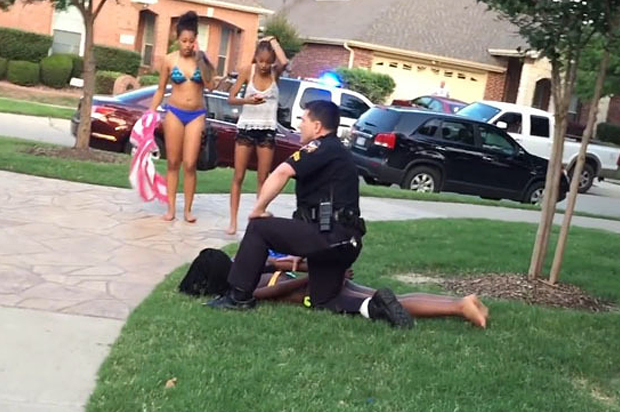Eric Casebolt, the McKinney, Texas police officer who resigned after a video circulated of him pinning a teenage girl to the ground over the weekend, is having a hard time.
The now-former corporal not only stepped down from his job this week, but has also widely been labeled a racist and reportedly received numerous death threats, prompting him to take his family into hiding. But, according to Casebolt’s attorney, Jane E. Bishkin, the officer’s troubles started well before he pressed 15-year-old Dajerria Becton’s face to the ground at a pool party on Friday.
In fact, that’s sort of why Casebolt did what he did in the first place. He was just mega stressed out that day.
“The video that everyone has seen only depicts a small part of Eric’s actions that day,” Bishkin said during a press conference on Wednesday. “Eric was assigned an evening shift that day, and began working at 6pm. His first call was a suicide at an apartment complex, where an African-American male had shot himself in the head at a poolside at the apartment complex. Immediately thereafter, he responded to a second suicide call. This one was involving a teenage girl who was threatening to commit suicide by jumping off of her parents’ roof.”
Bishkin went on to explain that when Casebolt received a radio call requesting backup for trespassing in the Craig Ranch neighborhood, he was inclined to ignore it, “given what he had just been through.” When the call was escalated and concerns of violent assault were mentioned, however, Casebolt responded — by arriving on the scene with the alleged intent of interviewing witnesses, but instead brutally detaining Becton while she pleaded to be released to her parents.
“Eric regrets that his conduct portrayed him and his department in a negative light,” Bishkin said. “He never intended to mistreat anyone, but was only reacting to a situation and the challenges that it presented. He apologizes to all who were offended.”
We’ll ignore for a moment that Casebolt and his attorney have opted to take the non-apology approach to apologizing publicly, by taking responsibility for offending people as opposed to taking responsibility for how he treated Becton. That the corporal has attempted to evade blame is not really surprising.
But the explanation for Casebolt’s behavior — that he was having a stressful day and his emotions were running high, which we could just as well call an “excuse” — isn’t one we tend to accept. At least not when it’s coming from a woman.
The narrative of women being “too emotional” to handle high-stress situations is a pervasive one, and has long been used as a justification for women’s exclusion from the professional sphere, especially; more recently, the notion has itself been relied on as an excuse for the dearth of female leadership in various fields (notably as president of the United States). But flipped around and applied to the behaviors of a male police officer — who was undoubtedly negatively affected by the horrors of suicide Casebolt faced earlier in the day — the idea of responding emotionally to stressful situations becomes not only understandable, but a sufficient rationale for violence.
None of this is to say Casebolt should have been feeling a-OK-just-fine when he arrived at Craig Ranch. Quite the opposite: It is only natural to experience higher levels of stress upon confronting the corpse of a man who has taken his own life, or a teenager who threatens to do the same.
But in a culture that denigrates sensitivity as “feminine” and bad, and praises those who bury their feelings as “masculine” and good, there is no room for a man — a cop — to say he can’t handle a few teenage trespassers after taking two suicide calls. There is only room for him to bury the stress and respond to the call of duty, even if and when doing so pushes him to brutality.
There is a difference, however, between conceding that Casebolt’s stress was likely very real and also very understandable, and accepting that as an excuse for his use of excessive force. Not only would the same standard surely be used to penalize a woman for being “too emotional,” but it also fosters a belief that violent masculinity and police brutality are tolerable standards for maintaining law and order. They aren’t. But Casebolt is asking us to believe as much.

